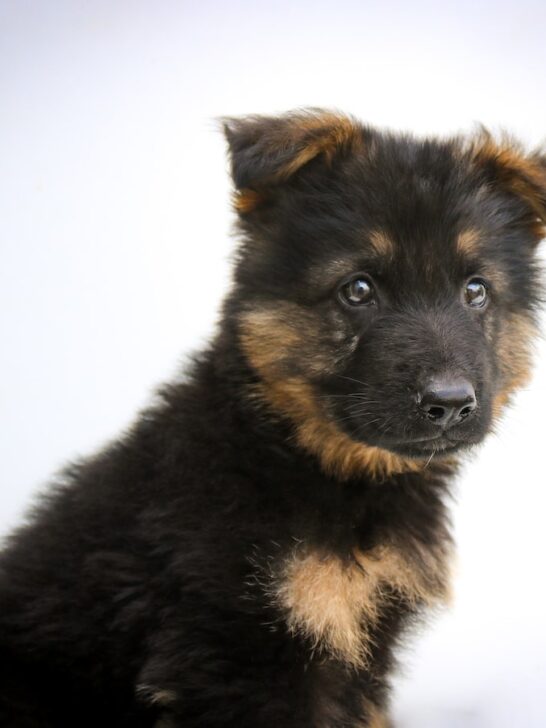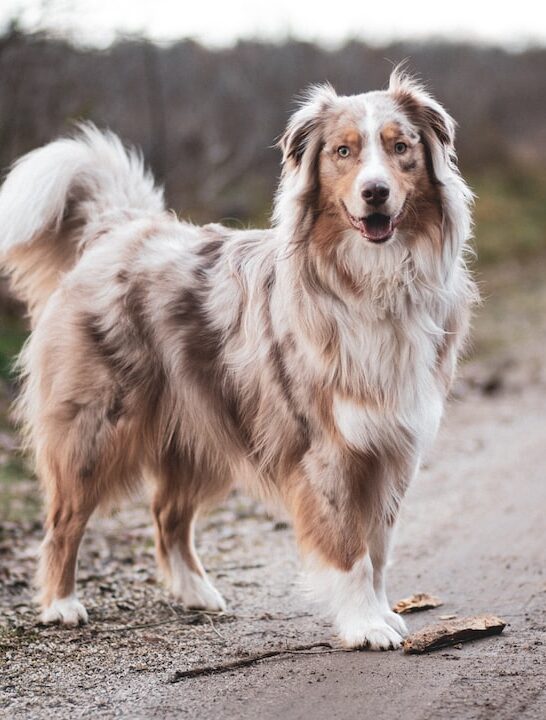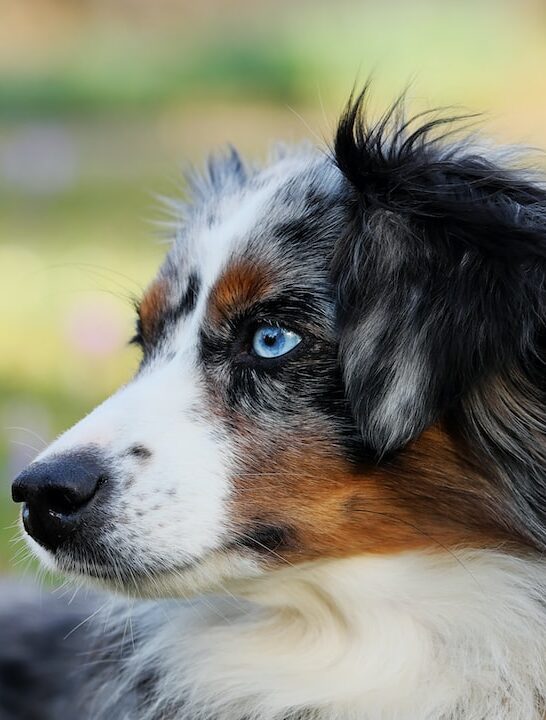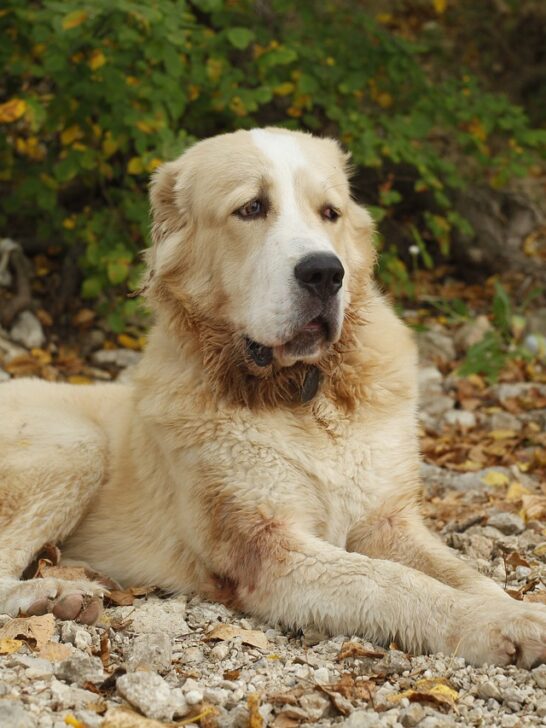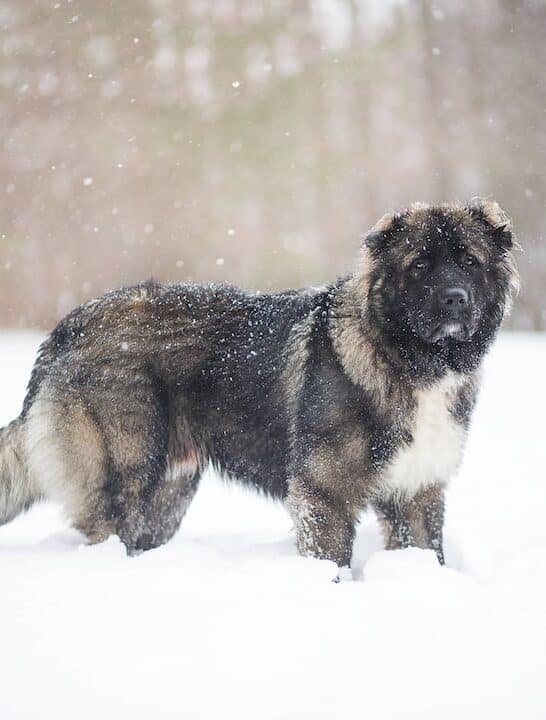History of The Long Haired Black German Shepherd Breed
|
Prefer listening over reading? We got you covered!
Getting your Trinity Audio player ready...
|
The black German Shepherd is a stunning variation of the German Shepherd. While they may look similar to the traditional black and tan Shepherds, these dogs have a solid black color that sets them apart. In this article, we will explore the origin and distinctive features of the black German Shepherd breed, as well as the typical health problems they may face. Additionally, you will find tips on finding a reputable black German Shepherd breeder and share insights into training and socializing a black German Shepherd puppy.
What is a Long-Haired Black German Shepherd?
With their beautiful, flowing coats that are richly hued in a deep black, these dogs captivate the hearts of all who lay eyes on them. Not only are they visually stunning, but they possess a remarkable intelligence and loyalty that is unparalleled. This breed is known for its protective instincts, making them excellent guard dogs and loyal companions. Their flowing mane exudes grace and resilience, truly setting them apart from other dogs. The long-haired coat not only adds to their regal appearance but also serves as a natural protection from harsh weather conditions. If you’re seeking a striking and devoted companion, look no further.
Origin and Background
Originating from Germany, this breed has been around for centuries and has been cherished for its striking appearance and exceptional qualities. With its lustrous, flowing coat and strong, well-built body, the breed exudes both grace and power. These intelligent and highly trainable dogs are known for their loyalty, courage, and unwavering dedication to their families. Their innate protective instincts make them excellent guard dogs, but they also excel in various roles such as search and rescue, therapy, and assistance work. The long-haired black GS thrives on mental and physical stimulation, which makes them an ideal companion for active individuals or families who are passionate about providing them with the love, care, and exercise they deserve. If you’re seeking a loyal and versatile canine companion, this breed is the perfect choice for you.
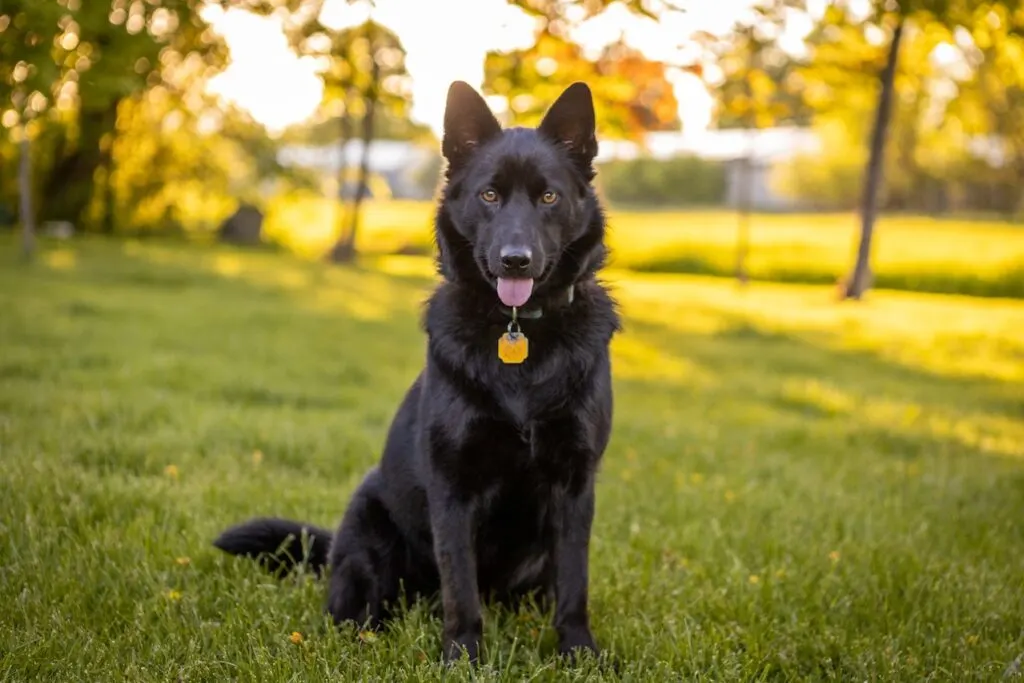
Breed history
The history of the long-haired black German Shepherd is closely intertwined with that of the German Shepherd. The GS breed was developed in the late 19th and early 20th centuries by a German cavalry officer named Captain Max von Stephanitz. His aim was to create a versatile working dog that excelled in various tasks, including herding, protection, and police work.
The early dogs exhibited a variety of coat colors and types, including long-haired individuals. However, the long-haired variety was initially considered less desirable due to concerns about its suitability for work and its potential to trap debris in its coat.
As the breed’s popularity grew and its roles expanded, the focus shifted from mere coat length to the dog’s overall abilities and temperament. The German Shepherd Dog Club of Germany (SV) was founded in 1899 and played a crucial role in standardizing the breed’s characteristics, including coat types.
While the long coat was initially not preferred for working dogs, some breed enthusiasts continued to value its aesthetic and unique qualities. These enthusiasts worked to maintain and promote the long-haired variety, which led to the emergence of long-haired German Shepherds, including those with black gene.
Today, long-haired black German Shepherds are recognized and appreciated by many enthusiasts and breeders for their beauty, loyalty, and versatility. They can be found in various roles, including as family companions, service dogs, therapy dogs, and in various canine sports and activities. Their history is a testament to the diverse nature of the breed and the dedication of breed enthusiasts in preserving its different variations.
Distinctive Features of the Breed
With its luscious coat, this shepherd exudes elegance and grace. The striking black fur not only adds an air of mystery but also provides excellent protection against the elements. It’s as if they were created to conquer the outdoors with their resilience and strength. These dogs possess a natural intelligence that surpasses many other breeds, making them excellent companions and working dogs. Their loyalty knows no bounds, and they are fiercely protective of their families. This perfect working dog will thrive as a herding dog as well as a family dog. What truly sets this breed apart is their unique combination of beauty and utility. Whether as a loving pet or a skilled working dog, they excel in both roles with great enthusiasm and dedication. Their physical prowess is matched only by their unwavering loyalty and unwavering dedication to their handlers. So, whether you are looking for a loyal and reliable companion or an exceptional working dog, the long-haired black GS is the breed for you. Embrace their distinctive characteristics, and let these magnificent creatures bring joy and purpose into your life.
Temperament and Personality Traits
The long-haired black German Shepherd possesses a temperament and personality that are truly exceptional. This magnificent breed is known for its intelligence, loyalty, and gentle nature. Whether you are seeking a loyal companion or a dedicated working partner, this dog has it all. Its long and flowing coat adds elegance to its already regal appearance, making heads turn wherever it goes. These dogs are highly adaptable and can thrive in various environments, from suburban homes to rural farms. With their intelligence and trainability, they excel in obedience and agility competitions. Their unwavering loyalty and protective nature make them excellent family pets, always ready to keep their loved ones safe. Embrace the unique qualities of a long-haired black GS and experience the joy and companionship they bring into your life.
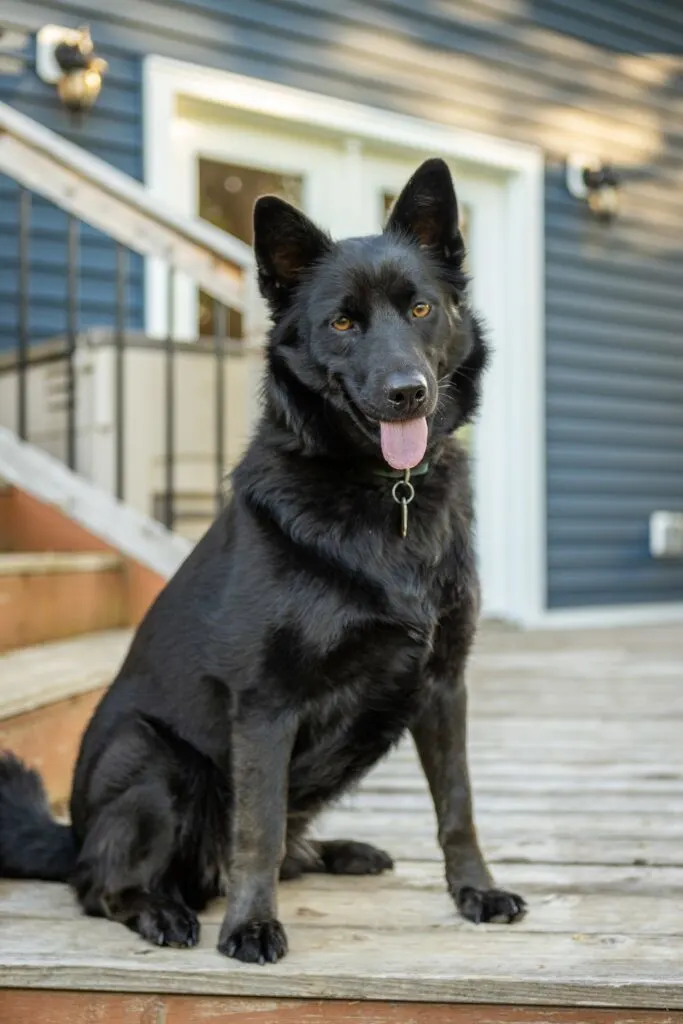
Breed Standard
Size
A large breed, with typical measurements ranging between 22 to 26 inches at the shoulder for males and 20 to 24 inches for females. The weight range usually falls between 65 to 90 pounds for males and 50 to 75 pounds for females.
Body
This variety maintains a muscular, well-proportioned, and robust body structure. The back is straight and level, while the chest displays depth and strength. Overall, the physique exudes both athleticism and sturdiness.
Coat
The coat is characterized by its medium to long length, displaying a dense and straight texture. The primary color is a rich black, devoid of any markings. While the standard typically adheres to an entirely black coat, a small white marking on the chest is generally considered acceptable. This dog boasts a double coat consisting of a dense undercoat and a coarse outer coat.
Head
In proportion to the body, the head exhibits a long, robust muzzle. The ears are medium-sized and erect, contributing to an alert and attentive appearance. The eyes are medium-sized, almond-shaped, and present a deep, dark hue.
Temperament
Renowned for their intelligence, composure, confidence, and protective nature, these dogs make exceptional family and working canines. Their loyalty and obedience make them well-suited for roles such as police work, search and rescue, and service to individuals with disabilities.
Gait
The gait of this dog is a testament to its power, fluidity, and efficiency. Their smooth stride showcases excellent reach and drive, allowing them to traverse terrain with grace and ease.
Variations
It’s worth acknowledging that minor deviations in the breed standard may arise based on the specific kennel club or breed organization that establishes the criteria. However, the characteristics outlined above generally align with the sought-after qualities of this breed.
How to Find a Reputable Breeder
Researching and Identifying Reliable Breeders
When looking for a black GS puppy, it is crucial to find a reputable breeder. Start by doing thorough research and identifying breeders with a good reputation. Look for breeders who are knowledgeable about the breed, follow ethical breeding practices, and prioritize the health and well-being of their dogs. To identify potential breeders, you can consult local breed clubs, explore online platforms dedicated to GS breeders, and gather recommendations. Once you’ve shortlisted breeders, arrange visits to their facilities. This hands-on approach allows you to meet the puppies, evaluate their living conditions, and gauge the breeder’s reputation. Inquire about the parents’ health records, genetic testing, and socialization efforts.
Visiting and Evaluating the Breeding Facility
Once you have narrowed down your options, take the time to visit the breeding facility in person. This will allow you to evaluate the living conditions of the dogs and ensure they are being raised in a clean and healthy environment. Meeting the breeder face-to-face will also give you the opportunity to ask questions and assess their knowledge and passion for the breed.
Ask for Health Certifications and Guarantees
Responsible breeders will provide health certifications for their breeding dogs, such as hip and elbow evaluations. They should also offer guarantees for the puppies they sell, ensuring that they are free from any genetic health issues. Don’t be afraid to ask for these certifications and guarantees before making a decision.
Typical Health Problems in the breed
Like all large dog breeds, German Shepherds, including the black variation, are prone to certain health issues. Some common problems in the breed include elbow and hip dysplasia, degenerative myelopathy, and allergies.
Regular vet check-ups, a balanced diet, and regular exercise can help minimize the risk of these issues. It is also important to choose a reputable breeder who performs health tests on their breeding dogs.
Dysplasia and Joint Issues
As with any large breed dog, long-haired shepherds are prone to certain health issues. One common issue is hip and elbow dysplasia, which is an abnormal development of the hip and elbow joints. This can cause pain and lameness in affected dogs. Regular exercise, a balanced diet, and weight management can help mitigate the risk of these joint issues.
Bloating
Bloating is a common symptom that can be caused by various factors. It is characterized by a feeling of fullness and discomfort in the abdominal area. While occasional bloating may be normal, persistent bloating could indicate an underlying health issue. It is important to identify the root cause of bloating and address it accordingly. Maintaining a healthy diet, managing stress levels, and staying hydrated can help alleviate bloating and improve overall digestive health.
Epilepsy
Epilepsy is a neurological disorder characterized by recurring seizures. These seizures result from abnormal electrical activity in the brain, causing various symptoms such as convulsions, loss of consciousness, and uncontrolled movements. While the exact cause of epilepsy is often unclear, it can be triggered by factors such as brain injuries, genetics, or certain medical conditions. Unfortunately, epilepsy can significantly impact a person’s quality of life, affecting their ability to work, drive, and lead a normal day-to-day existence.
Diabetes
Diabetes is a chronic disease that affects the body’s ability to regulate blood sugar levels. It can lead to serious complications such as kidney damage, heart disease, and vision problems if left untreated or poorly managed. Diabetes requires constant monitoring of blood sugar levels, strict adherence to medication or insulin regimens, and lifestyle adjustments including maintaining a healthy diet and regular exercise. It is important to take diabetes seriously and seek proper medical care to prevent further problems.

Just like any dog with long hair, this particular breed may be more prone to coat-related skin conditions, such as matting or dermatitis. It is important to regularly groom and brush their coat to prevent these issues. In some cases, a professional groomer may be necessary to maintain the health and appearance of their coat.
Other Common Health Concerns
While the breed is generally healthy, they may still be prone to certain health concerns, such as digestive issues, allergies, and ear infections. Regular veterinary check-ups, a balanced diet, and proper grooming can help prevent and manage these common health problems.
Selecting the Perfect Puppy
When selecting a puppy, consider several factors. Begin by ensuring the puppy’s health by confirming appropriate vaccinations and deworming. Assess the puppy’s temperament and socialization. Opt for a puppy that displays curiosity, friendliness, and confidence. A well-socialized puppy is more receptive to training and integration into your family.
Training and Socializing your Puppy
Early Socialization and Exposure to Various Environments
Proper socialization is essential for black Shepherd puppies. Start socializing them from a young age by exposing them to different environments, people, animals, and experiences. This will help them develop into well-behaved and confident adult dogs.
Expose your long-haired german shepherd puppy to varying environments, people, and animals to encourage well-roundedness and confidence. This holistic approach contributes to their growth as composed and well-adjusted adult dogs.
Basic Obedience Training Techniques
Effective training and socialization are pivotal for all dogs, including those with long, black coats. Initiate training early, employing positive reinforcement techniques to cultivate a strong bond and instill fundamental commands and obedience.
Begin training your black German Shepherd puppy with basic obedience commands, such as sit, stay, and come. Use positive reinforcement techniques, such as treats and praise, to motivate and reward their good behavior. Consistency and patience are key when training these intelligent dogs.
Building a Strong Bond Through Positive Reinforcement
Building a strong bond with your black German Shepherd puppy is crucial for their overall well-being and behavior. Positive reinforcement training methods, which involve rewarding desired behaviors, will help strengthen the bond between you and your puppy. Spend quality time together, engage in activities they enjoy, and always show them love and affection.
Keep in mind that caring for a long-haired black German Shepherd puppy entails commitment, resources, and time. Prepare for the responsibilities of training, exercise, grooming, and veterinary care. With diligent care and nurturing your long-haired black puppy will evolve into a cherished and devoted companion.
Prepare Your Home
Prior to your long-haired puppy’s arrival, ensure your home is safe and adapted for their needs. Remove potential hazards, create a designated sleeping area, and gather essential supplies like food, water bowls, toys, leash, collar, and grooming tools. Once your new companion arrives, concentrate on socialization and training. Puppies flourish with exposure to diverse experiences, individuals, and surroundings. Dedicate time to obedience training, house training, and basic commands.
Care
Caring for a Black German Shepherd breed involves providing proper nutrition, exercise, grooming, training, and regular veterinary care. Here are some specific tips for caring for a Black German Shepherd.
Nutrition
Feed your long-haired Shepherd a high-quality dog food that is appropriate for their age, size, and activity level. The food should contain a balanced combination of protein, fats, carbohydrates, vitamins, and minerals. Consult with your veterinarian for specific recommendations.
Exercise
Black German Shepherds are highly active and require regular exercise to keep them physically and mentally stimulated. Aim for at least one to two hours of exercise per day, which can include walks, runs, hikes, playtime, and training activities. Don’t forget to allocate some time spent outside for sniffing. The act of sniffing holds vital significance for the overall well-being of every dog. I believe it’s imperative to include this aspect in any article that addresses exercise.
Grooming and Coat Care Tips
Long-haired solid black german shepherd have a dense double coat that sheds heavily, especially during shedding seasons. Grooming a long-haired dog requires regular brushing to prevent matting and tangles. Pay special attention to areas such as behind the ears and under the tail. Bathing should be done as needed, using a dog-friendly shampoo. Additionally, check their ears regularly for any signs of infection and trim their nails as needed.
Veterinary Care
Schedule regular veterinary check-ups for your canine to ensure their overall health and catch any potential issues early on. Keep up with vaccinations, parasite prevention, dental care, and any other recommended treatments.
Mental Stimulation
In addition to physical exercise, Black German Shepherds need mental stimulation to prevent boredom and destructive behaviors. Provide them with interactive toys, puzzles, and training sessions that challenge their intelligence and problem-solving skills.
Don’t forget about sniffing
Make sure to give your dog enough opportunities for sniffing. While it might be tempting to rush our dogs during time constraints, affording them the opportunity to engage in sniffing is nearly as vital as the physical exertion they receive during a walk. For a dog, sniffing isn’t just a way to explore the world. Through scents, they can understand and stay connected with their surroundings, which significantly increases their physical and psychological well-being.
Temperature control
As with all dogs, long-haired shepherds just like standard German Shepherds can be sensitive to extreme temperatures. Ensure they have access to shade and fresh water during hot weather and provide them with a warm and comfortable shelter during cold weather.
Remember that each dog is an individual, so it’s important to tailor the care to their specific needs and preferences. Regular interaction, love, and attention are vital to building a strong bond with your Black German Shepherd and ensuring their overall well-being.
Understanding the Genetic Factors Behind Long Hair
The long-hair gene in this breed is recessive, which means both parents must carry the gene for a long-haired puppy to be born. Breeders who specialize in long-haired dogs carefully select breeding pairs to ensure the desired coat type is passed on to the offspring. It is important to note that long-haired breed varieties are not recognized in the breed standard and cannot compete in conformation shows.
Summary
In conclusion, the long-haired German Shepherd dog is a captivating variation of the breed. With their striking appearance and exceptional qualities, they make excellent working dogs and loyal family companions. When looking to add a long-haired black dog to your family, it is crucial to find a reputable breeder who prioritizes the health and temperament of their canines. Proper training and socialization are vital for these intelligent dogs to thrive. Whether short-haired or long-haired, purebred German Shepherds continue to be beloved for their unwavering loyalty and their ability to excel in various roles.
























